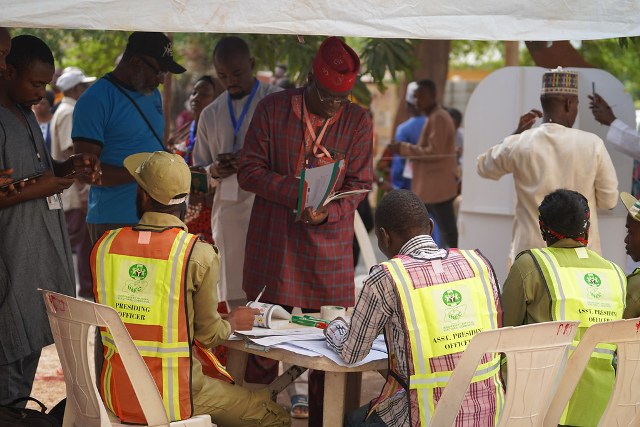 25 February 2023: Nigeria elections. [photo: Commonwealth Observer Group on ComSec Flikr]
25 February 2023: Nigeria elections. [photo: Commonwealth Observer Group on ComSec Flikr]
[This is an excerpt from an article in The Round Table: The Commonwealth Journal of International Affairs.]
Nigeria’s 2023 general elections have come and gone except for the rescheduled elections in a few places and the off-season governorship elections in Kogi, Imo and Bayelsa states. While the presidential and national assembly elections were held on 25 February 2023, subnational elections were held on 18 March 2023. Since Nigeria’s democratic rebirth in 1999, the just concluded electoral cycle translates into 24 years of uninterrupted electoral democracy – the longest in the political and democratic history of Nigeria.
Before the elections, President Muhammadu Buhari used different local and international platforms to assure Nigerians and the international community that his government would oversee a free, fair and credible electoral process in 2023. This electoral cycle actually offered the president a great opportunity to bequeath to Nigeria and Nigerians a legacy of electoral propriety. Professor Mahmood Yakubu, the chairman of the Independent National Electoral Commission (INEC), also promised a transparent and credible electoral process. In a lecture delivered at the Royal Institute of International Affairs (Chatham House) in London on 17 January 2023, Yakubu recognised the daunting challenges ahead and promised that the elections would rank among the best ever conducted in Nigeria.
Nigeria’s 2019 general elections – a shattered hope? – A 2020 special Round Table Journal edition
Opinion – Anatomy of Nigeria’s electoral process: a missing rib
Nigeria’s 2019 general election: what does it mean for the rest of the world?
In addition, there was a great optimism among Nigerians and many international observers that this electoral cycle would be a major improvement on the previous ones. The signing into law of the amended Electoral Act in 2022 to provide the legal framework for the elections and help address many problems confronting the administration of elections in Nigeria inspired this optimism. The major provisions etched in the amended Act include the early release of funds to INEC, early release of the election timetable, the use of electronic devices for accreditation and result transmission purposes, and enhanced power of the electoral body to review results, particularly in areas where the electoral guidelines are not followed. INEC introduced technological innovations that would promote the transparency of the electoral process and boost citizens’ trust. These were the Bimodal Voter Accreditation System (BVAS) for the accreditation and electronic transmission of results and INEC Result Viewing (IReV) portal to serve as a repository of results from polling units.
Find out more about the Commonwealth Round Table and the Round Table Journal
The optimism which came with the preparations notwithstanding, the actual conduct of elections was remarkably flawed. Many Nigerians and observers were surprised by the disruptions witnessed during the elections. The thinking in many quarters was that the old days of electoral anarchy were gone for good. When one remembers the mishandling of elections in the past and the mechanisms put in place by the Attahiru Jega-led INEC (significantly improved upon by the current administration of Mahmood Yakubu), the discredited nature of the outcomes of the 2023 elections is bewildering.
Segun Oshewolo & Ademola Azeez are with the Department of Political Science, Afe Babalola University, Ado-Ekiti, Nigeria.



